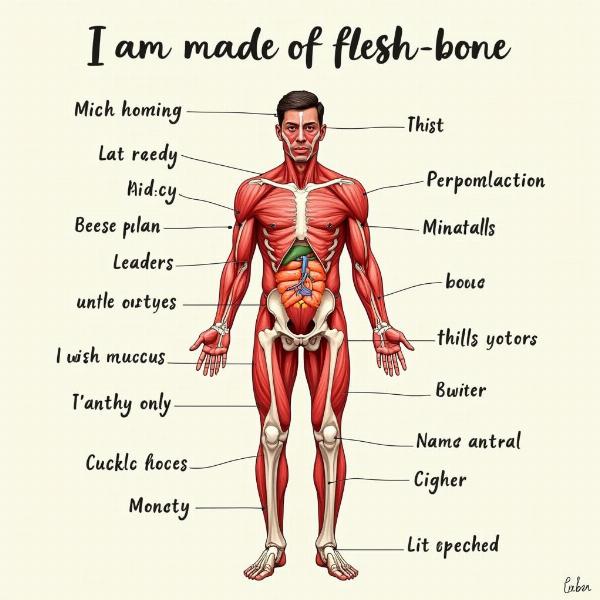Understanding the nuances of translating “I am made” into Hindi can be tricky. It’s not a simple one-to-one translation, and the best choice depends heavily on the context. Are you talking about your physical composition, your personality, your destiny, or something else entirely? This article explores the various ways to express “I am made” in Hindi, covering different contexts and providing examples to help you choose the most appropriate translation.
Exploring the Different Meanings of “I Am Made”
The phrase “I am made” can have various interpretations in English itself. Before diving into Hindi translations, let’s clarify these different meanings:
- Physical Composition: Referring to the materials or elements that constitute your physical being (e.g., “I am made of flesh and bone”).
- Personality/Character: Describing your inherent qualities or traits (e.g., “I am made of stronger stuff”).
- Destiny/Purpose: Expressing a sense of predestination or inherent purpose (e.g., “I am made for this”).
- Creation/Origin: Indicating the process or source of your existence (e.g., “I am made in God’s image”).
 Physical Composition: Human Body Anatomy
Physical Composition: Human Body Anatomy
“I Am Made” in Hindi: Contextual Translations
Now that we’ve outlined the possible meanings, let’s explore their Hindi equivalents:
Physical Composition:
-
मैं … से बना/बनी हूँ (Main … se bana/bani hun): This is the most direct translation, meaning “I am made of…”. The word “bana” is used for masculine subjects, while “bani” is used for feminine subjects. For instance:
- “I am made of flesh and bone” translates to “मैं माँस और हड्डी से बना/बनी हूँ (Main maans aur haddi se bana/bani hun).”
- “I am made of star stuff” translates to “मैं तारों की धूल से बना/बनी हूँ (Main taaron ki dhool se bana/bani hun).”
Personality/Character:
-
मेरा स्वभाव … है (Mera swabhav … hai): This translates to “My nature is…” and is suitable for describing inherent personality traits. For example:
- “I am made of stronger stuff” could be translated as “मेरा स्वभाव मज़बूत है (Mera swabhav mazboot hai),” meaning “My nature is strong.”
- You could also use phrases like “मैं दृढ़ निश्चयी हूँ (Main dridh nishchayi hun)” – “I am determined.”
Destiny/Purpose:
-
मेरा जन्म … के लिए हुआ है (Mera janm … ke liye hua hai): Meaning “I am born for…”, this phrase conveys a sense of purpose or destiny. For instance:
- “I am made for this” translates to “मेरा जन्म इसके लिए हुआ है (Mera janm iske liye hua hai).”
-
मुझे … के लिए बनाया गया है (Mujhe … ke liye banaya gaya hai): Meaning “I am made for…” in a passive voice, this emphasizes a sense of being created for a specific purpose.
Creation/Origin:
- ईश्वर ने मुझे बनाया है (Ishwar ne mujhe banaya hai): This translates to “God has made me,” suitable for expressing creation in a religious context.
Choosing the Right Translation
The correct translation of “I am made” in Hindi depends entirely on the intended meaning. Consider the context carefully and choose the option that best conveys your message. Using the wrong translation can lead to misunderstandings.
Conclusion: Mastering the Nuances of “I Am Made” in Hindi
Understanding the subtle differences in meaning and choosing the appropriate Hindi equivalent is crucial for effective communication. By considering the context and using the examples provided, you can accurately express the intended meaning of “I am made” in Hindi.
FAQs:
- What is the most common way to say “I am made of” in Hindi? The most common way is “मैं … से बना/बनी हूँ (Main … se bana/bani hun).”
- How do I say “I am made for this” in a way that emphasizes destiny? Use “मेरा जन्म इसके लिए हुआ है (Mera janm iske liye hua hai).”
- Is there a difference between “bana” and “bani”? Yes, “bana” is used for masculine subjects and “bani” for feminine subjects.
- How do I express the idea of “I am made of strong character” in Hindi? You can say “मेरा स्वभाव मज़बूत है (Mera swabhav mazboot hai)” or “मैं दृढ़ निश्चयी हूँ (Main dridh nishchayi hun).”
- Can I use “मुझे … के लिए बनाया गया है (Mujhe … ke liye banaya gaya hai)” in secular contexts? Yes, it can be used to express the idea of being suited for something, even without a religious connotation.
- How do I translate “I am made in God’s image”? A suitable translation would be “मैं ईश्वर के स्वरूप में बना/बनी हूँ (Main Ishwar ke swaroop mein bana/bani hun).”
- Where can I find more resources for Hindi translation? Meaning-Hindi.in offers comprehensive Hindi translation services.
Meaning-Hindi.in is your one-stop solution for all your Hindi translation needs. We offer a wide range of services, from business and legal document translation to website localization and technical translation. Our team of expert translators ensures accurate and culturally sensitive translations. Contact us today at [email protected] or call us at +91 11-4502-7584. Meaning-Hindi.in – Bridging the language gap.